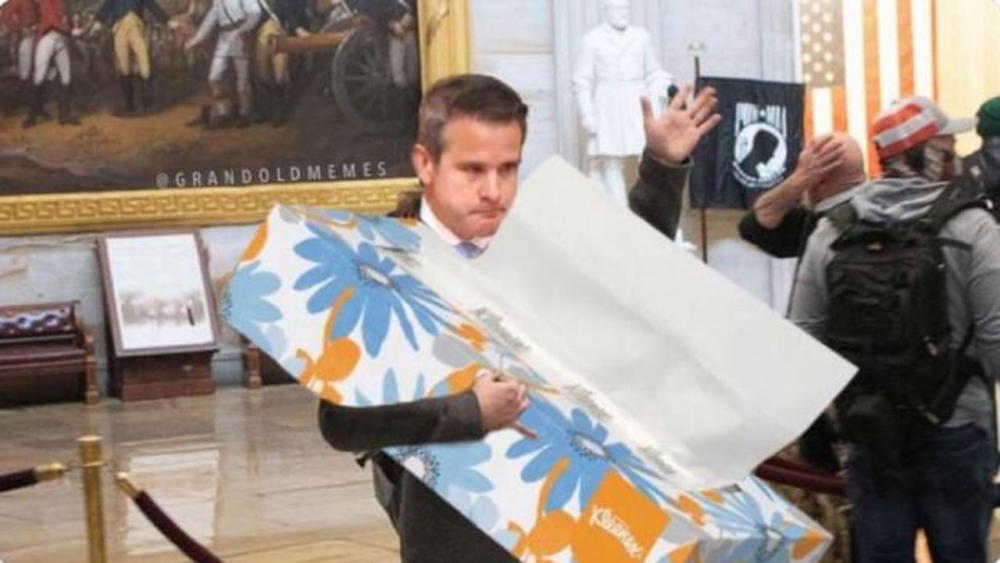Leaderboard
Popular Content
Showing content with the highest reputation on 10/31/2021 in all areas
-
Because it's part time? I guess that opens the question of what happens when one goes on orders or a unit activation, I'm guessing that individual would be exempted. I personally think having military representation/experience in government is a good thing, beyond Veteran's Preference for federal jobs. Lindsey Graham, Ted Lieu, others. Why further widen the already huge gulf between the citizenry you serve, and the military membership? Frankly I'm at the other end of things, and feel more politicians should have stake in America than just ambition, vanity and ego. I'd support a service requirement just to qualify for office. I disagree with a lot of you, I feel the loss of Kinzinger is a bad thing. Obviously I'm not a MAGA guy but I'm no lefty either.2 points
-
2 points
-
If a service is "free" chances are the product they are selling is you (or your information). What about personal responsibility? People can choose to limit their use, or to just not use the service. Facebook doesn't *make* you keep reading or clicking on the links. Maybe the answer is better education on recognizing when you are being manipulated. First step of fighting being manipulated by propaganda is recognizing you are being fed propaganda. Of course the reasons social media companies do what they do is monetary, that's literally the capitalist system we have. They have no requirement to act in the best interests of society. Even laws aren't a hindrance if the punishment for breaking the law is just a fine, especially if the company can still reap a profit. But too often the cry from the right is that anything affecting their sources of money/power is socialism. And the left is guilty as well, usually slapping the label of fascism on anything that affect their sources of money/power. I take the problem as a different one. At some point, we lost sight of the fact that we're all Americans in this country and in it together, for better or for worse. We have allowed the political parties to sell a narrative that the other party is what is dividing the country and therefore the enemy. That's what is dividing the country, and social media just adds fuel to the fire. All that being said, what you propose is a worthwhile debate to be had in our country. But I don't expect Congress will take any real action for the benefit of the citizenry, just whatever benefits whichever party is in power2 points
-
Idk man, everyone is talking about flying 2-3 legs a day, commuting, or how to maximize their pay. Seems like a lot of work. Easier to just move to a junior base, sit reserve, and join a nearby guard unit. At this point in my life, I'm basically just a stay at home dad that either goes to play dress up at the airport a few days a month (if that) as a 3rd year WB F/O, or I go play dress up at the squadron, drink beers, and bullshit with the boys during the mil leave periods I utilized to avoid having to fly. This shit is checkers, it ain't chess.2 points
-
Less than two months removed from running away from Afghanistan in the middle of the night - ISIS Threat in Northern Virginia Let's go Brandon2 points
-
While I agree with jazz dude initially, the problem is that companies like Facebook are making money through advertising before and after the links that a user posts. And the very act of users posting links to other news sources is what keeps eyeballs on the Facebook newsfeed. If users were no longer allowed to post links to other sources then other Facebook users would be less likely to spend as much time on facebook, meaning Facebook would not be able to advertise as much. So while it is not a direct relationship, Facebook is very much making money off of those links. I don't know what sort of payment model is required for Facebook to continue this arrangement, but it's not accurate to compare it to a web board like base ops, because fundamentally Facebook models themselves around making money on those exact interactions. As far as influence goes, I'm afraid I don't have a great answer for that either. We're clearly now in a middle ground between the government's constitutional obligation to defend free speech in a private organizations constitutionally protected right to run their business as they see fit. Honestly I don't find Facebook as comparable in this dilemma as I do the government. Too many elected and unelected officials have been using the social media companies to do what they cannot. If this trend continues, I suspect the only solution would be to subject the social media companies to the same constitutional obligations that the government is subject to. And then we have the third problem of personalization and tracking. It is problematic that every individual user experiences a different internet based on an algorithmic encapsulation of all of their previous browsing behavior. It's creating a social problem, while at the same time making social media companies billions in profits. I think we probably need legislation that bans tracking users across websites and domains. If Facebook wants to track users actions on facebook, and adjust their Facebook experience accordingly, I have no issue with that. But what you do on Facebook should not translate to what you see on a Google search, or an Amazon product search, or what advertisements appear on CNN. These algorithms are ultimately tuned for one purpose, to keep your eyeballs where they are. The second and third order effects are a rapid increase in conspiracy theory and distrust/hatred of neighbors with opposing viewpoints. I'm not sure the live-and-let-live philosophy of individual liberty can survive in a society where profitable algorithms and self-serving media/political figures prevent us from knowing and loving our neighbors with different views. It's healthy and normal that you cannot control who you bump into in the broader world. It exposes you to a diversity of experiences and ideas. These algorithms are having the exact opposite effect, while the internet is more and more becoming a part of the public space. I think it is probably in our best interests to maintain some element of unpredictable encounters if we don't want that split into multiple societies with myopic views.2 points
-
Because guys in the Guard and Reserve usually have real jobs and can tell the big military to naff off as needed..Not unheard of for a say .. staff sergeant to personally know and maybe went to High School with a Senator or Congress critter and those associations can work better than four stars and the big military knows it.. oop's goblins arrive....chow....1 point
-
Why? They are just wearing different hats at different times. Congress should represent our citizenry, and that includes those in uniform as reservists. Where would you draw the line? What if a congressman was in the Guard? Should reservists be barred from state government as well? Should executive branch also bar reservist from serving in a civilian capacity? For example, the was a former SECNAV who was also a Navy reservist O-5 at the same time and an active NFO on flight status. https://en.m.wikipedia.org/wiki/John_Lehman1 point
-
1 point
-
1 point
-
1 point
-
1 point
-
1 point
-
I thought a lot about your question last night and to be honest I don't have a good answer or even know if there is one. I've said it before but I personally felt that Milley and McKenzie should've resigned for the way the Afghan withdrawal was conducted. That isn't really an answer to your question though, because they just happened to be the guys in charge when everything came crashing down; tough to blame them for at least 18+ years of official fallacies we (both State and DoD) were telling ourselves and the American public about how the war in Afghanistan was going. My thoughts in no particular order. 1. Part of this is cultural, both in our military and in our political leadership. We (in the officer ranks) all should bear some responsibility for this. On the military side, we rarely (almost never) want to or will actually say "no". It's in our DNA that if we're given a task or mission, we'll figure out a way to get it done. And nobody gets promoted for saying they can't accomplish something (see the Navy's destroyer mishaps as the latest example of severe consequences of this mentality). We've grown and groomed our leadership this way. Almost no one from the top generals/SESs down to probably the at least the FGO level wanted to admit that things weren't going well and that the goal of an independent, democratic Afghanistan free from most Taliban/VEO interference (if that was the goal) wasn't attainable (at least not in any reasonable timeframe). 2. We (talking the royal we, USA at large) tend to have a belief that the US is capable of accomplishing anything if we set our minds to it. And in the late 90s-early 2000s we were still coming off of the rapid, smashing success of Desert Storm. The American public was willing to keep things going so long as the casualties were relatively low and they didn't have to personally pay anything for it. Our public is also as separated from the military as it's ever been and our political class hasn't voted for "military action since the AUMF back in '01. A lot of us also mistakenly hold the belief that everyone in the world wants our version of democracy. 3. "Sometimes you have to let things fail". Don't know how many times I've heard senior leaders say this one in my career but I've rarely seen it actually utilized. I get that "failure" with something as large as the entire Afghan campaign is orders of magnitude different than some new process at the squadron level but it feeds back to point #1. Nobody in our senior leadership wanted to be the guys holding the bag when things ended in the Stan. They would have rather kept the war going indefinitely than admit our ever shifting goals were unattainable. Honesty was less acceptable than the static quo because no one could admit that we were going to fail. 4. Tactical success vs. Operational/Strategic failure. This one goes without saying. If our Operational/Strategic goals were unattainable from the get go, 20 years of killing people and spending money was never going to translate into a win. To answer your original question about who to hold accountable, I honestly think it's probably the bulk of the DoD and State leadership chain for the last 18 years (from at least O-6s all the way to the top, maybe lower). I don't believe the US military was able to be honest with either itself or our civilian leadership about the war. I understand that's probably not a popular opinion. I know a lot of vets were having trouble (a lot probably still are) processing what happened two months ago. The bulk of the rhetoric/messaging has been aimed at us doing our duty, no more attacks on the homeland, etc. That's all well and good, and probably appropriate for the time, but we lost, and I think we need to figure out how to avoid these sort of mistakes/failures going forward. I don't think anyone is going to get fired over this, so to your question over accountability, it'll probably be hashed out in the history books versus public hearings, resignations, some GO/FO or retired GO/FO actually saying "I'm responsible". Not a very satisfying answer I'm afraid.1 point
-
Good post above by Dirk. So in the end, who takes responsibility for the failures? And I don’t mean Bush, Obama, Trump, or Biden…they’re politicians, not military strategists, and unless they were the ones feeding the American citizens lies, then they were just doing what most other politicians would have done in their shoes at the given time. I mean who (that does this for a living) in the DoD takes the public hit that they either manipulated the data (ie lied about the the capabilities of the Afghans) to make it look like what we were doing was working or who takes the public hit that they (DoD officials, military or civilian) were so incompetent they truly believed the Afghans were capable when we were going to leave? Or is just a complete failure at all levels of our DoD from the lowly CGO/NCO all the way up the top? That’s the problem—there’s no public accountability for this huge failure and we are left with people shrugging their shoulders. And our country is so politically divided that Biden and/or the Dems in Congress don’t truly want to get to the bottom of it because it’s making Biden look bad to keep it in the light (I’m sure the same could be said if Trump/the GOP were in charge). So in the end, no one is publicly held accountable, strategically our military’s ability to achieve it’s future goals is decreased, and American citizens lose even more faith in the integrity/capabilities of our military. Yeah…if I’m China, I’m definitely invading Taiwan if they believe it’s in their best interest to do so. The US isn’t going to stop them.1 point
-
In my opinion, it extended much further down than just the top level GO/FO leadership. Long but interesting anecdotal story. When I was a young staff officer I was assigned to be my command's GSOS lead (Global Special Operations Synchronization, it's how SOCOM is supposed to prioritize where it puts SOF, feeds into the GFM process). BLUF is its a multi-phase process with a lot of data collection/processing and in person PPTs to a board. During my second year doing doing this, SOJTF-A J35 was presenting their Campaign Plan for the conference (presented to a board of 6 O-6s from SOCOM), SOJTF-A team was made up of an O-6 and several O-5s and civilians. The SOJTF-A team VTCs in and has this very bright, optimistic "this is the year we turn it all around, X years to stem the tide, XX years to seize the initiative, we're gonna take it to them with this new strategy, etc, etc, etc). I think they even used the word "defeat" in some of their presentation. The O-6 board receives the presentation, asks a few minor questions, then says great job, go get'em, we really appreciate you", or something to that effect and starts to move on. That would've been the end of it except for 1 O-5 Army Strategist (extremely intelligent guy who was about as cynical as they come) in the audience. He stands up in this room full of 50 people with god knows how many others in VTC land and politely asks what's different about this year compared to all the other years in the Stan (this conference was in early 2018). When SOJTF-A says they don't understand his question, he expands by saying what they've presented looks remarkably similar to his 2005 experience, which also mirrored the time he was there in 2009, while not differing all that much from the strategic plan in 2011, seemed shockingly similar to his deployment in 2013, and he didn't see all that much change from 2015-2017. He then asked how on god's green earth they were going to seriously degrade or possibly defeat the enemy with a fraction of the resources previously available and an ANA that wasn't that much more capable and suffering a record high number of casualties. The crazy/really eye opening moment to this whole thing was that the SOJTF-A guys just sat there dumbstruck, like they couldn't believe anyone wouldn't believe in or would dare question their plan. They literally had no answer. I seriously think several of them honestly believed the nonsense they were presenting. The O-6 board quietly ruffled through their notes or stared at their hands. The O-5 strategist shook his head and sat down. Will always be one those random moments in my career I'll never forget and the moment I knew we could've been in the Stan for another 20 years and it wouldn't have changed the ultimate outcome one bit.1 point
-
Maybe Trump was on to something with the sanctions? It wasn't exactly an even playing field with China. I'm all for free trade but more-so if all players play ball. The more industry and manufacturing that moves back to America the better.1 point
-
Not at all. The entire point of an airline career is to work little and get paid a lot...it isn't about the passion or enjoyment of flying. An airline career gives you both the time and finances to enjoy life outside of work, rather than simply cramming your families, hobbies, and other passions into the little crevasses around that supermajority chunk of your time and emotional energy that a military career demands. Manage that money correctly, and you'll be able to retire early and *really* do whatever it is you would do if you had financial freedom (like fly cool shit for fun!)1 point










